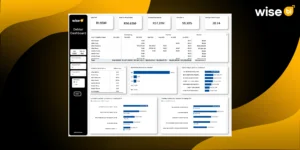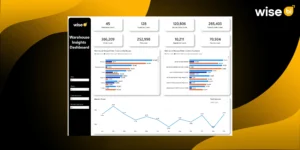Real-time visibility and data-driven decision-making are more crucial than ever in today’s quick-paced logistics sector. Freight forwarders and logistics firms that utilize CargoWise Next rely significantly on business intelligence (BI) reports to simplify operations, save costs, and improve customer service.
However, many logistics professionals have trouble with sluggish reporting, scattered data, and non-compliance tracking, all of which affect operational efficiency. BI reports become crucial at this point. They give teams immediate access to vital information, enabling them to proactively handle problems, uphold compliance, and make smart decisions.
The top ten BI reports that every CargoWise Next user requires will be discussed in this blog. Whether you’re a branch manager, accounting team, or sales director, these reports will change the way you track, analyze, and optimize logistics processes.
1. Mandatory Field Compliance Reports
Freight forwarders need to ensure that every shipment meets data integrity standards to maintain compliance and deliver accurate tracking to customers.
This report highlights missing or incomplete data across shipments, allowing teams to:
- Quickly correct compliance issues before they impact operations.
- Improve data entry discipline to avoid errors in reporting.
- Identify process gaps that lead to non-compliance.
In an industry where shippers demand full visibility, ensuring 100% compliance is crucial for maintaining trust and operational efficiency.
2. Invoicing Speed Report
Invoicing delays can cause cash flow disruptions and delayed payments, impacting overall financial stability.
This report provides a real-time view of:
- How fast invoices are generated after shipment delivery.
- The average time taken to collect payments.
- Billing efficiency by department or branch.
For branch managers and accounting teams, this report ensures that customers are billed on time, helping maintain steady cash flow and reduce outstanding receivables.
3. Vendor Credit Balance Report
Freight forwarders need to keep track of credit balances with vendors to manage cash flow effectively and avoid overpayments.
This report enables instant access to:
- Outstanding vendor credits per invoice and shipment.
- Total credit balances by supplier or agent.
- Aging balances to prevent unclaimed credits.
By ensuring real-time tracking of vendor credits, freight companies can optimize payment cycles and avoid financial inefficiencies.
4. AP Aging Reports
Managing accounts payable (AP) efficiently prevents cash flow obstacles and ensures vendors are paid on time.
- Generates a pivot table of all unpaid invoices, categorized by:
- Account level
- Shipment level
- Invoice level
Provides real-time insight into due payments, enabling better cash flow planning.
For accounting teams, this report is vital for financial health monitoring and ensuring timely vendor payments.
5. Customer Analysis Dashboard
To understand customer behavior and drive retention, loyalty, and long-term profitability.
- Customer retention and churn rates
- Lifetime value and engagement trends
- Profitability by customer segment
Sales, marketing, and customer success teams if you are looking to reduce churn, enhance customer experience, and build stronger, data-driven relationships customer analysis dashboard is the solution.
6. Revenue and Volume Analysis Dashboard
To provide a clear view of business performance, enabling smarter financial and operational decisions.
- Revenue and volume by group, country, product, branch, and department
- Trends, patterns, and underperforming areas
- Revenue leakages and growth opportunities
Revenue and volume analysis dashboard is useful for finance leaders, operations managers, and decision-makers aiming to boost profitability and drive business growth through targeted performance analysis.
7. Branch Performance Report
With multiple locations, freight forwarders need real-time visibility into how each branch is performing.
- Tracks costs, revenue, margins, and shipment volume by branch.
- Enables performance benchmarking across regions.
- Helps optimize operations for underperforming branches.
For regional directors and logistics owners, this report ensures efficient branch management.
8. Department Performance Report
Not all logistics departments operate with the same efficiency. Monitoring performance by department helps optimize resource allocation.
- Break down performance by transport mode, department, or service type.
- Tracks KPIs such as shipments handled, revenue generated, and profitability.
- Helps identify obstacles in operations and take corrective actions.
For branch managers, this report ensures optimized workflows across different transport modes.
9. Shipment Analysis Dashboard
To optimize shipping operations through data-driven insights for smarter and faster decision-making.
- Shipment volume and job count
- Trade lane performance
- Continental and regional shipment trends
Logistics managers, freight forwarders, and supply chain analysts looking to improve operational efficiency, reduce costs, and gain complete shipment visibility with the shipment analysis dashboard.
10. Freight-Specific Filters for Advanced Data Analysis
Every logistics business operates differently based on transport modes, trade lanes, and customer types. Standard reports lack freight-specific filtering options.
- Allows users to filter data by transport mode (Air, Ocean, Road, Rail).
- Enables drill-down analysis by container type, route, or trade lane.
- Helps in trend identification for operational improvements.
For data analysts and freight forwarders, this feature provides customizable insights for better decision-making.
Why choose Wise BI?
Wise BI specializes in creating custom BI development dashboards that connect smoothly with CargoWise Next Users. Our pre-built and customizable reports enable freight forwarders to gain vital insights quickly, saving time and increasing efficiency.
Are you prepared to advance your CargoWise Next reporting? Schedule a free consultation today to find out how Wise BI’s dashboards can transform your logistics reporting!
Conclusion
Automated business intelligence reports are at the heart of the logistics industry’s transition to data-driven decision-making. Real-time insights are essential for maintaining competitiveness in any field, including financial reporting, compliance monitoring, and operational analysis.




